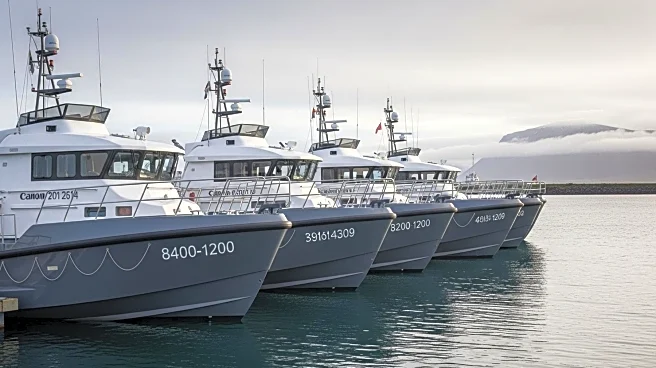What is the story about?
What's Happening?
The Icelandic Transport Authority has declared 121 ships unfit to sail after safety checks revealed inadequate maintenance of their lifeboats. The lifeboats, serviced by Skipavík ehf, were found to have poor-quality maintenance, leading the company to voluntarily surrender its operating license. The Transport Authority has invalidated all inspections conducted by Skipavík since mid-2024, citing the need to ensure seafarer safety. The affected vessels are considered unseaworthy under the Shipping Act until new inspections are completed. The Icelandic Coast Guard reported that 18 of these vessels were at sea within the past week, and ship operators have been informed of the necessary steps to address the issue. The Transport Authority plans to offer free re-inspections before the end of 2025.
Why It's Important?
This development highlights significant safety concerns within Iceland's maritime industry, potentially affecting the operations of numerous vessels and their crews. The revocation of seaworthiness certificates could disrupt shipping activities, impacting trade and economic activities reliant on maritime transport. The incident underscores the importance of rigorous safety standards and oversight in the industry, prompting a reassessment of maintenance practices and regulatory compliance. The situation may lead to increased scrutiny of service providers and stricter enforcement of safety regulations, aiming to prevent similar occurrences in the future.
What's Next?
The Icelandic Transport Authority's offer of free re-inspections suggests a proactive approach to resolving the issue, ensuring that affected vessels can return to service safely. Ship operators will need to comply with new inspection requirements to regain their seaworthiness certificates. The maritime industry may experience temporary disruptions as vessels undergo re-inspections, potentially affecting shipping schedules and logistics. Stakeholders, including ship operators and service providers, are likely to review and enhance their maintenance protocols to align with regulatory standards and prevent future safety lapses.
Beyond the Headlines
The incident raises broader questions about the accountability and reliability of service providers in the maritime industry. It may prompt discussions on the ethical responsibilities of companies involved in safety inspections and the need for transparent reporting and oversight. The situation could lead to long-term shifts in industry practices, emphasizing the importance of quality assurance and continuous monitoring to safeguard seafarer welfare and maritime operations.

















